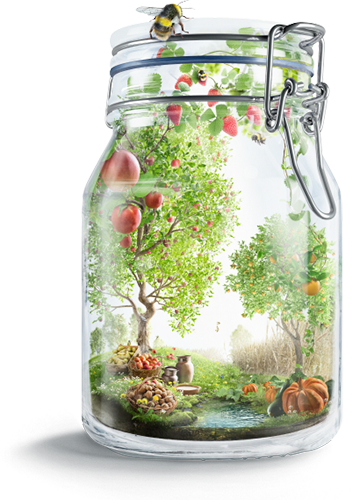
Understanding the importance of pollinators
Our world is home to amazingly complex and delicately balanced ecosystems. To help them survive and thrive now and in the future, we need to conserve biodiversity in all its facets. After all, every species, no matter its size, has an essential role to play in helping Mother Nature provide a bountiful harvest.

The Hero Group bee careful initiative
As a food company, we know that it’s critical to conserve, defend, protect, and nurture a wide variety of fruits, vegetables, nuts, legumes, and other crops so everyone can enjoy the goodness of nature. We rely on intact ecosystems and a wide diversity of species. With special attention on pollinators, we initiated the bee careful initiative back in 2014 to raise awareness on the importance of bees and pollinators and support pollinator health and habitats.

To bee
We firmly believe we can make products that are better for people and the planet by using resources in a far-sighted and future-proof manner. We can’t do this alone. This is why we are partnering with farmers, our closest allies, to create sustainable agricultural systems. Our goal: conserving the goodness of nature in our products while fostering biodiversity throughout our entire value chain.


... or not to bee
Insect pollinators like bees are essential to sustain natural biodiversity. At the end of the day, about one-third of our food relies on insect pollination. We’ve been working to raise public awareness of the importance of bees and conserve fruit diversity since 2014. The mission of our initiative is to preserve habitats for pollinators, promote soil and pollinator health, and encourage biodiversity-friendly agriculture practices on and around our partners’ farms.
Photo source: The EAT-Lancet Commission
The main aims behind bee careful are:
- Preserving habitats for pollinators
- Promoting soil and pollinator health
- Encouraging biodiversity-friendly agriculture practices on and around our partners’ farms
- Raising awareness for the importance of pollinators

“The future of our planet depends on sustainable and intelligent treatment of our biosphere… it is a wonderful initiative by the Hero Group to support basic honeybee research.”

Jürgen Tautz
Professor at the University of Würzburg and manager of Wee4Bee (formerly Honey Bee Online Studies)

Examples of outstanding projects
Over the past years, many projects were carried out by Hero Group subsidiaries. As one of the biggest projects, the bee research stations in Schwartau and Würzburg (both in Germany), and Bournemouth (UK) are a key component of the initiative. These stations were co-funded by the Hero Group companies Schwartau and Organix. The teams in Germany and the UK are working together with Wee4Bee (formerly the Honey Bee Online Studies - HOBOS) to perform comparative research analyses using the data from these high-tech beehives. These studies include insights into universal or location-dependent factors influencing bee biology and health, which can be helpful for beekeepers all over the world.
In other projects, Schwartau has launched a ‘bee-helper’ natural spread with which the company raises awareness with over two million consumers on the importance of pollinators. The company has contributed to funding the plantation of over 2,500 pollinator-friendly high-stem fruit trees such as wild meadows. Since 2022, Schwartau has been collaborating with fruit farmers, supporting them to initiate agricultural practices to foster biodiversity and soil health.


Hero MEA (Middle East & Africa) has initiated a long-term project to help save a distinctive type of Egyptian bee from extinction. This project is strongly related to biodiversity, one of the biggest concerns around environmental sustainability. Hero Benelux has funded a bee education center and is involved in projects aimed at increasing the biodiversity in the city of Breda where they have their offices.
In southern Europe, Hero Spain is spreading the word about bee health by increasing external communication and aligning it with a new honey product made from their own bee-hives.

